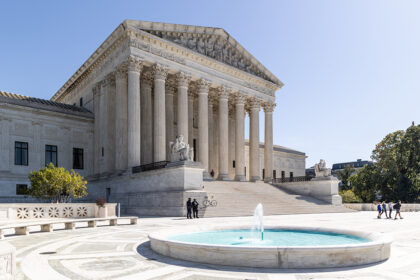In the appeal to Supreme Court, crypto exchange Coinbase is willing to send the two lawsuits – Bielski v. Coinbase and Suski v. Coinbase – into arbitration.
On Tuesday, March 21, the US Supreme court is all set to hear its first-ever crypto case in history. Nine chief justices will hear the plea from lawyers representing crypto exchange Coinbase asking to pause a pair of class-action lawsuits against the crypto trading platform.
However, this case is not quite on the technicalities or the legality of crypto matters. Instead, the case involves a procedural argument on whether a lawsuit should proceed in the federal case. In this case, crypto exchange Coinbase is attempting to send the dispute to arbitration.
Arbitration is a method of out-of-court dispute resolution wherein the odds are often stacked against the customers. Crypto exchange Coinbase is currently facing two lawsuits – Bielski v. Coinbase and Suski v. Coinbase. The federal court in California has allowed these two lawsuits to continue while Coinbase is now willing to send them into arbitration.
Last April, in the Bielski case, the US District Court for the Northern District of California denied Coinbase’s appeal to move the case into arbitration. The court said that Coinbase’s arbitration clause is “unconscionable” and uses a “litigation gimmick” wherein the users stand at a disadvantage in the case of a dispute.
Later in July last year, Coinbase moved to the next higher court, the San Francisco-based 9th US Circuit Court of Appeals, which decided to uphold the decision.
In this case, Abraham Bielski has filed a lawsuit against Coinbase seeking compensation for the $31,000 he lost from his Coinbase account. Bielski said that the scammer managed to get remote access to his Coinbase account.
Coinbase and Class-Action Lawsuits
Crypto exchange Coinbase has been facing a number of class-action lawsuits which cover a wide range of issues. Coinbase is facing allegations of selling unregistered securities as the US Securities and Exchange Commission (SEC) has deemed certain tokens to be securities.
On Tuesday, the Supreme Court will also review another case – Suski v. Coinbase – concerning a million-dollar sweepstakes event that the exchange held in June 2021. Suski said that he and other customers were misled into the advertising by Coinbase which suggested that one needs to buy or sell $100 worth of Dogecoin (DOGE) to qualify for a chance to win. But Suski added that in reality, users who didn’t trade Dogecoin (DOGE) were also eligible.
As the friction between crypto p[layers and regulators continue to grow, Supreme Court’s involvement is likely to grow in such matters. Some market analysts believe that the ripple vs SEC case could also find its way to the US Supreme Court.
Bhushan is a FinTech enthusiast and holds a good flair in understanding financial markets. His interest in economics and finance draw his attention towards the new emerging Blockchain Technology and Cryptocurrency markets. He is continuously in a learning process and keeps himself motivated by sharing his acquired knowledge. In free time he reads thriller fictions novels and sometimes explore his culinary skills.



